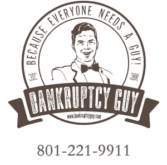Bankruptcy FAQs:
What Is Chapter 7 Bankruptcy?
Chapter 7 bankruptcy, sometimes called a straight bankruptcy is a liquidation proceeding. The debtor turns over all non-exempt property to the bankruptcy trustee who then converts it to cash for distribution to the creditors. The debtor receives a discharge of all dischargeable debts usually within four months. In the vast majority of cases the debtor has no assets that he would lose so Chapter 7 will give that person a relatively quick “fresh start”. One of the main purposes of Chapter 7 Bankruptcy is to give a person, who is hopelessly burdened with debt, a fresh start by wiping out his or her debts.
What Is Chapter 13 Bankruptcy?
Chapter 13 Bankruptcy is also known as a reorganization bankruptcy. Chapter13 bankruptcy is filed by individuals who want to pay off their debts over a period of three to five years. This type of bankruptcy appeals to individuals who have non-exempt property that they want to keep. It is also only an option for individuals who have predictable income and whose income is enough to pay their reasonable expenses with some amount left over to pay off their debts.
Will My Spouse Be Affected?
It is not always necessary for both spouses to file bankruptcy. The question that must be asked is whether both spouses are responsible for the debt that is being sought to be discharged. Under current law debts are divided into separate and marital obligations. You are not responsible for the separate debts of your spouse. However, you may be responsible for the martial debts incurred by them even though you did not sign the contract. Thus if your spouse has an obligation for food, clothing, shelter, utilities, or medical expenses you will probably be responsible for those debts. If only your spouse files bankruptcy, these creditors are then able to pursue you to collect the debt. Since it is often cheaper and easier to file a joint bankruptcy than to fight the claims of marital debt creditors it may be better that both of you file bankruptcy.
How Quickly Can I File Bankruptcy?
The answer to this question depends in large measure on how quickly you can provide the attorney with the information needed to prepare your bankruptcy paper work. The typical bankruptcy filing takes one to seven days. However, in an emergency the attorney may be able to file the same day if you can supply him with sufficient information to do so.
Can I Own Anything After Bankruptcy?
Yes! Many people believe they cannot own anything for a period of time after filing for bankruptcy. This is not true. You can keep your exempt property and anything you obtain after the bankruptcy is filed. However, if you receive an inheritance, a property settlement, or life insurance benefits within 180 days after filing for bankruptcy, that money or property may have to be paid to your creditors if the property or money is not exempt.
Who Will Know?
Bankruptcy filings are public records. However, under normal circumstances, no one will know you filed for bankruptcy. The Credit Bureaus will record your bankruptcy and it will remain on your credit record for 10 years.
Will I Have To Go To Court?
In most bankruptcy cases, you only have to go to a proceeding called the “meeting of creditors” to meet with the bankruptcy trustee and any creditor who chooses to come. Most of the time, this meeting will be a short and simple procedure where you are asked a few questions about your bankruptcy forms and your financial situation. Occasionally, if complications arise, or if you choose to dispute a debt, you may have to appear before a judge at a hearing. If you need to go to court, you will receive notice of the court date and time from the court and/or from your attorney.
Can I Keep Any Credit Cards?
Whether a debtor keeps credit cards after filing bankruptcy is up to the credit card company. If you are discharging a credit card they will cancel the card unless you reaffirm the debt. Even if you have a zero balance the credit card company might cancel the card.
Will I Ever Get Credit Again?
Yes! A number of banks now offer “secured” credit cards where a debtor puts up a certain amount of money (as little as $200) in an account at the bank to guarantee payment. Usually the credit limit is equal to the security given and is increased as the debtor proves his or her ability to pay the debt. Two years after a bankruptcy discharge, debtors are eligible for mortgage loans on terms as good as those of others, with the same financial profile, who have not filed bankruptcy. The size of your down payment and the stability of your income will be much more important than the fact you filed bankruptcy in the past. The fact you filed bankruptcy stays on your credit report for 10 years. It becomes less significant the further in the past the bankruptcy is. The truth is, that you are probably a better credit risk after bankruptcy than before.
Can My Boss Fire Me For Filing Bankruptcy?
No. U.S.C. Sec. 525, prohibits any employer from discriminating against you because you filed bankruptcy.
Can Filing Bankruptcy Stop Bill Collectors From Calling?
Yes. An automatic stay is put into effect and prohibits bill collectors from taking any action to collect debts.
How Do I Go Into Bankruptcy?
There are two ways a person can become bankrupt. The first and more common way is to have the person file a petition to voluntarily go bankrupt. The second, and rarely used way, is for creditors to ask the Court to make an Order that a person is bankrupt. In both these cases a Bankruptcy Trustee is required to administer the bankruptcy.
Do I Have To Use A Lawyer To Go Into Bankruptcy?
No. You do not need to use a lawyer to file Chapter 7 or Chapter 13. However, we advise that you use the services of an experienced bankruptcy attorney as bankruptcy is now very complex. A bankruptcy lawyer is well worth the cost. You will save the cost of the legal fees many times over through peace of mind, release of stress and probably actual money saved in following your bankruptcy attorney’s advice.

Contact Us

